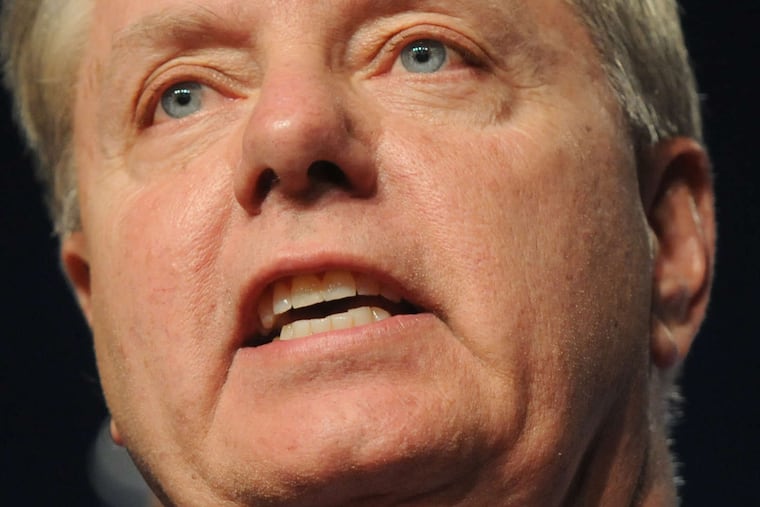GOP Sen. Graham ends presidential bid
WASHINGTON - Sen. Lindsey Graham ended his long-shot presidential bid Monday, telling supporters in a web video that he succeeded in changing the conversation about how to fight the Islamic State.

WASHINGTON - Sen. Lindsey Graham ended his long-shot presidential bid Monday, telling supporters in a web video that he succeeded in changing the conversation about how to fight the Islamic State.
"Four months ago, at the very first debate, I said that any candidate who did not understand that we need more American troops on the ground in Iraq and Syria to defeat ISIL was not ready to be commander in chief," said Graham (R., S.C.). "At that time, no one stepped forward to join me. Today, most of my fellow candidates have come to recognize this is what's needed." The Islamic State, a terrorist group that controls large tracts of Iraq and Syria, is also known as ISIS and ISIL.
Graham's bid, which never cracked 1 percent in primary polls, locked up an unusual amount of elite support. Sen. John McCain (R., Ariz.), his closest friend in the Senate, immediately endorsed Graham and campaigned with him throughout New Hampshire. Scores of South Carolina donors, who might have otherwise jumped to higher-polling candidates, stayed on Graham's team out of loyalty - and on the chance that his moderate campaign broke through.
"I think we all owe him a debt of gratitude," said David Wilkins, the South Carolina chairman of Graham's finance committee, who served as ambassador to Canada under President George W. Bush. "His decision frees up a lot of very strong Lindsey Graham supporters here to make new endorsements, but it's too soon for me. This is Lindsey's day."
By leaving the race Monday, Graham was able to remove his name from his home state's primary ballot, creating the sort of free-for-all in the first Southern contest that candidates such as Jeb Bush and Sen. Marco Rubio (R., Fla.) have desired for months. Matt Moore, the chairman of the South Carolina Republican Party, confirmed that Graham was off the ballot within 40 minutes of the announcement.
That spared Graham a likely defeat in his home state, and marked the end of a candidacy that even opponents came to respect. Graham liked to tell audiences that he had been dubbed "Lindsey Gomez" and "Grahamnesty" for his work on multiple immigration reform bills, yet won a competitive 2014 Senate renomination fight. He hoped that proved the GOP was more moderate than advertised; his political opponents credited his success to his jovial, honest, and open personality.
"To his credit, I think Lindsey Graham is one of the few who has been at least honest about suggesting 'here is something I would do that the president is not doing,' " President Obama told NPR in an interview published shortly before Graham quit the race. "He doesn't just talk about being louder or sounding tougher in the process."
Just six days ago, Graham - whose sizable Senate campaign war chest gave him more financial stability than other underdogs - was resisting any rumor that he might quit or pull his name off the ballot. In the Las Vegas debate spin room, after what will have been his last "undercard" performance, Graham said that he would push at least through the New Hampshire primary. Yet privately, according to Graham strategist Brett O'Donnell, the senator was thinking about a way out of the race.
"It's something he's been contemplating for a while, and he waited for a bit, just wanted to make sure," O'Donnell said. "It came together over the weekend, but it's been on his mind for a few weeks. If you know him, you know he's fiscally responsible. He was raised that way and he didn't want to go into debt on the campaign. I know that was weighing on him. He wanted to go out on his own terms. So, after a great debate last week - he dominated the undercard in our view - it was time. He ends it on a high."
Still, he would have preferred to end it a little higher. In January, when Graham announced his presidential exploratory committee, he was excited about the chance to challenge Sen. Rand Paul (R., Ky.) to a debate over his "isolationism." When Sen. Ted Cruz (R., Texas) began to rise in polls, Graham condemned his politics, warning a gathering of the Republican Jewish Coalition that unbending right-wing stances would doom the party in 2016.
"If you are going to tell a woman who has been raped she has to carry the child of a rapist, you're losing most Americans," Graham said. "Good luck with that."
Yet it was Donald Trump, the GOP front-runner whom no one saw coming, that absorbed most of Graham's attacks. The senator, a retired colonel in the Air Force Reserve and a sponsor of multiple immigration reform bills, characterized Trump as a "xenophobic" ignoramus whose campaign was making the country and Republican Party weaker.